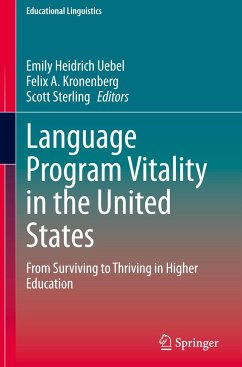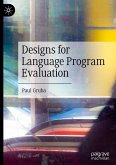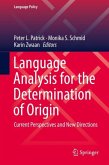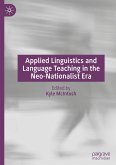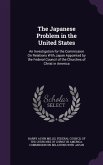Language Program Vitality in the United States
From Surviving to Thriving in Higher Education
Herausgegeben:Heidrich Uebel, Emily; Kronenberg, Felix A.; Sterling, Scott
Language Program Vitality in the United States
From Surviving to Thriving in Higher Education
Herausgegeben:Heidrich Uebel, Emily; Kronenberg, Felix A.; Sterling, Scott
- Gebundenes Buch
- Merkliste
- Auf die Merkliste
- Bewerten Bewerten
- Teilen
- Produkt teilen
- Produkterinnerung
- Produkterinnerung
The perception of a permanent enrollment crisis in US postsecondary foreign language education has shaped our profession's image for an entire generation of educators. Over the past 30 years, this crisis rarely invited self-examination or inspired creativity. Instead, it was routinely attributed to external factors: shrinking budgets, unsympathetic administrators, disengaged students. This volume is refreshingly optimistic: After providing a nuanced picture of the complex enrollment situation and focusing on perceptions of language education among undergraduate students, the volume features an…mehr
Andere Kunden interessierten sich auch für
![Language Program Vitality in the United States Language Program Vitality in the United States]() Language Program Vitality in the United States113,99 €
Language Program Vitality in the United States113,99 €![Researching and Teaching the Chinese Language Researching and Teaching the Chinese Language]() Researching and Teaching the Chinese Language113,99 €
Researching and Teaching the Chinese Language113,99 €![Designs for Language Program Evaluation Designs for Language Program Evaluation]() Paul GrubaDesigns for Language Program Evaluation105,99 €
Paul GrubaDesigns for Language Program Evaluation105,99 €![Language Analysis for the Determination of Origin Language Analysis for the Determination of Origin]() Language Analysis for the Determination of Origin113,99 €
Language Analysis for the Determination of Origin113,99 €![Language Analysis for the Determination of Origin Language Analysis for the Determination of Origin]() Language Analysis for the Determination of Origin113,99 €
Language Analysis for the Determination of Origin113,99 €![Applied Linguistics and Language Teaching in the Neo-Nationalist Era Applied Linguistics and Language Teaching in the Neo-Nationalist Era]() Applied Linguistics and Language Teaching in the Neo-Nationalist Era106,99 €
Applied Linguistics and Language Teaching in the Neo-Nationalist Era106,99 €![The Japanese Problem in the United States The Japanese Problem in the United States]() Harry Alvin MillisThe Japanese Problem in the United States41,99 €
Harry Alvin MillisThe Japanese Problem in the United States41,99 €-
-
-
The perception of a permanent enrollment crisis in US postsecondary foreign language education has shaped our profession's image for an entire generation of educators. Over the past 30 years, this crisis rarely invited self-examination or inspired creativity. Instead, it was routinely attributed to external factors: shrinking budgets, unsympathetic administrators, disengaged students. This volume is refreshingly optimistic: After providing a nuanced picture of the complex enrollment situation and focusing on perceptions of language education among undergraduate students, the volume features an inspiring panorama of successful models that revitalized language programs at a wide range of institutions. The diversity of approaches to post-secondary language education in the United States featured in this volume highlights that there are no simple "one size fits all" solutions. To be transformational, initiatives need to be intimately calibrated to the evolving needs and desires of our institutions' most important stakeholder: the student. Per Urlaub, Massachusetts Institute of Technology, MA, USA
Produktdetails
- Produktdetails
- Educational Linguistics 63
- Verlag: Springer / Springer International Publishing / Springer, Berlin
- Artikelnr. des Verlages: 978-3-031-43653-6
- 1st ed. 2023
- Seitenzahl: 400
- Erscheinungstermin: 10. November 2023
- Englisch
- Abmessung: 241mm x 160mm x 27mm
- Gewicht: 764g
- ISBN-13: 9783031436536
- ISBN-10: 3031436539
- Artikelnr.: 68531479
- Herstellerkennzeichnung Die Herstellerinformationen sind derzeit nicht verfügbar.
- Educational Linguistics 63
- Verlag: Springer / Springer International Publishing / Springer, Berlin
- Artikelnr. des Verlages: 978-3-031-43653-6
- 1st ed. 2023
- Seitenzahl: 400
- Erscheinungstermin: 10. November 2023
- Englisch
- Abmessung: 241mm x 160mm x 27mm
- Gewicht: 764g
- ISBN-13: 9783031436536
- ISBN-10: 3031436539
- Artikelnr.: 68531479
- Herstellerkennzeichnung Die Herstellerinformationen sind derzeit nicht verfügbar.
Emily Heidrich Uebel (Ph.D., University of Wisconsin¿Madison) is an Academic Specialist at the Center for Language Teaching Advancement (CeLTA) and the Associate Executive Director of the National Less Commonly Taught Languages Resource Center (NLRC) at Michigan State University. Her research interests include foreign language proficiency, educational technology and online instruction, curriculum design, LCTL education, and education abroad topics. More information can be found on her website. Felix A. Kronenberg is the Director of the Center for Language Teaching Advancement (CeLTA), Director of the National Less Commonly Taught Languages Resource Center (NLRC), and an Associate Professor of German in the Department of Linguistics, Languages, and Cultures at Michigan State University. His research interests include physical, virtual, and hybrid language learning spaces, educational technology, curriculum design, and program administration. More information can be found on his website. Scott Sterling (Ph.D., Michigan State University) is an Associate Professor of linguistics and TESL at Indiana State University. His research includes meta-research, research ethics, and second language acquisition. More information can be found on his website.
Introduction; E. Heidrich Uebel, F. A. Kronenberg, S. Sterling.- Part I.- The MLA Language Enrollment Census and beyond: From Research to Advocacy; L. Tang, N. Lusin.- Modern Language Enrollment at Community Colleges in the U.S.; T. Nagano.- Part II.- Amplifying student voices: Undergraduate student perspectives on expanding access and increasing relevance of world language study; D. Murphy, J. Martin.- Understanding student (a)motivation towards learning a language: students' perspectives on continued language study; M. D'Amico, S. Sterling.- Why Doesn't Everyone Take a World Language Class? University Students' Perspectives on World Language Learning; B. Linford.- Motivational Factors Affecting More and Less Commonly Taught Language Student Enrollment and Retention; S. Crum, P-K. Kivik.- Preparing for the future: What do high school students think about language learning? R. Simonsen.- University students' beliefs about the foreign language requirement; C. Cinaglia.- What About Now?: Tracking the Progression of African Language Courses at a large Southern University; A. Cacciatore, E. J. de Jong.- Leveraging student surveys to promote recruitment and retention, L. Spino.- Portuguese Language Program Evaluation; B. Sommer-Farias, A. M. Carvalho.- Part III.- Reimagining and Rebranding the 21st Century Foreign Language Department; P. Moore-Martinez.- Uniting on all Levels; J. Sokolosky.- Centering Intercultural Skills to Sustain Language Programs in the Digital Age; K. MacLean.- It Takes a Village: A Planned Initiative Toward Language Program Revitalization; R. S. Borden, D. M. Anderson.- Professional Content-Based Courses for Novice Language Learning; J. Fees.- The Seal of Biliteracy as a recruitment opportunity; J. Eckereson.- The Language Brief: Showcasing Language Learning Opportunities; S. A. Maggin, J. C. Baskerville Jr., J. D. Benjamin, J. M. Pendergast.- Internationalize Your Major: Embracing Language Study's Supportive Role; L. Edwards, J. Lynd.- Centers of Change: Forming Administrative Structures to Support Language Study; G. Cory Duclos, Y. Hirata.- Staying afloat; attracting Hebrew language students with collaboration and the use of Content Based Instruction; A. Raz, O. Eubanks-Segal.- Contributing Factors and Achievable Solutions to the World Language Enrollment Downturn: A Midwestern Case Study; E. Langley.- Expanding Access through Online Asynchronous Language Courses; K. May-Chu, J. Court, J. Williamson, J. Wipplinger.- Leveraging Language for Specific Purposes as a Motivating Factor for Foreign Language Study Leveraging Language for Specific Purposes as a Motivating Factor for Foreign Language Study, Z. Miller, S. Maggin, C. Chenoweth, J. Benjamin.- A Multilanguage Seminar for the Twenty-First Century: Rethinking Self-Instruction for the Least Commonly Taught Languages; K. Thompson.- Language as a Bridge to Other Disciplines; D. Reisinger.- Community-engagement as an innovative way to revitalize language programs; S. Blaise.- Innovative Strategies for Stabilizing Enrollment in Korean as a Foreign Language (KFL) Education; Y-m. Cho, H. Chung Chun.- Trial, Error, and Success: Recruitment and Retention Initiatives in a Small German Program; K. Lange, S. Windham.- Changing the Narrative Around Language Study; R. Ulland.- Retaining Students with Shared Courses and Meaningful Credentials; L. Rosen, K. Kong.- Language Programs at Rochester Institute of Technology: A Successful Recent Initiative (2018-Present); S. Armengot.- The Revamp of a Language Major in a Business Institution; C. Rubio.- Global Honors: Responding to Language Learners' Real World Goals; C. Baumann.- The Language Certificate: Encouraging Foreign Language Proficiency for All University Students; T. Cox, M. Wilcox.
Introduction; E. Heidrich Uebel, F. A. Kronenberg, S. Sterling.- Part I.- The MLA Language Enrollment Census and beyond: From Research to Advocacy; L. Tang, N. Lusin.- Modern Language Enrollment at Community Colleges in the U.S.; T. Nagano.- Part II.- Amplifying student voices: Undergraduate student perspectives on expanding access and increasing relevance of world language study; D. Murphy, J. Martin.- Understanding student (a)motivation towards learning a language: students' perspectives on continued language study; M. D'Amico, S. Sterling.- Why Doesn't Everyone Take a World Language Class? University Students' Perspectives on World Language Learning; B. Linford.- Motivational Factors Affecting More and Less Commonly Taught Language Student Enrollment and Retention; S. Crum, P-K. Kivik.- Preparing for the future: What do high school students think about language learning? R. Simonsen.- University students' beliefs about the foreign language requirement; C. Cinaglia.- What About Now?: Tracking the Progression of African Language Courses at a large Southern University; A. Cacciatore, E. J. de Jong.- Leveraging student surveys to promote recruitment and retention, L. Spino.- Portuguese Language Program Evaluation; B. Sommer-Farias, A. M. Carvalho.- Part III.- Reimagining and Rebranding the 21st Century Foreign Language Department; P. Moore-Martinez.- Uniting on all Levels; J. Sokolosky.- Centering Intercultural Skills to Sustain Language Programs in the Digital Age; K. MacLean.- It Takes a Village: A Planned Initiative Toward Language Program Revitalization; R. S. Borden, D. M. Anderson.- Professional Content-Based Courses for Novice Language Learning; J. Fees.- The Seal of Biliteracy as a recruitment opportunity; J. Eckereson.- The Language Brief: Showcasing Language Learning Opportunities; S. A. Maggin, J. C. Baskerville Jr., J. D. Benjamin, J. M. Pendergast.- Internationalize Your Major: Embracing Language Study's Supportive Role; L. Edwards, J. Lynd.- Centers of Change: Forming Administrative Structures to Support Language Study; G. Cory Duclos, Y. Hirata.- Staying afloat; attracting Hebrew language students with collaboration and the use of Content Based Instruction; A. Raz, O. Eubanks-Segal.- Contributing Factors and Achievable Solutions to the World Language Enrollment Downturn: A Midwestern Case Study; E. Langley.- Expanding Access through Online Asynchronous Language Courses; K. May-Chu, J. Court, J. Williamson, J. Wipplinger.- Leveraging Language for Specific Purposes as a Motivating Factor for Foreign Language Study Leveraging Language for Specific Purposes as a Motivating Factor for Foreign Language Study, Z. Miller, S. Maggin, C. Chenoweth, J. Benjamin.- A Multilanguage Seminar for the Twenty-First Century: Rethinking Self-Instruction for the Least Commonly Taught Languages; K. Thompson.- Language as a Bridge to Other Disciplines; D. Reisinger.- Community-engagement as an innovative way to revitalize language programs; S. Blaise.- Innovative Strategies for Stabilizing Enrollment in Korean as a Foreign Language (KFL) Education; Y-m. Cho, H. Chung Chun.- Trial, Error, and Success: Recruitment and Retention Initiatives in a Small German Program; K. Lange, S. Windham.- Changing the Narrative Around Language Study; R. Ulland.- Retaining Students with Shared Courses and Meaningful Credentials; L. Rosen, K. Kong.- Language Programs at Rochester Institute of Technology: A Successful Recent Initiative (2018-Present); S. Armengot.- The Revamp of a Language Major in a Business Institution; C. Rubio.- Global Honors: Responding to Language Learners' Real World Goals; C. Baumann.- The Language Certificate: Encouraging Foreign Language Proficiency for All University Students; T. Cox, M. Wilcox.

